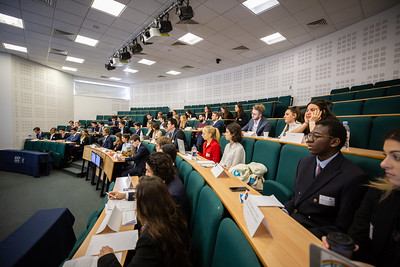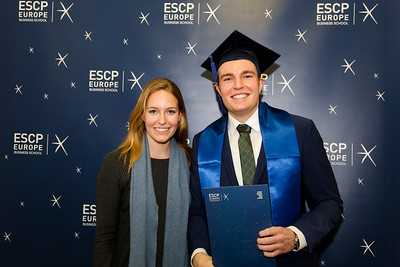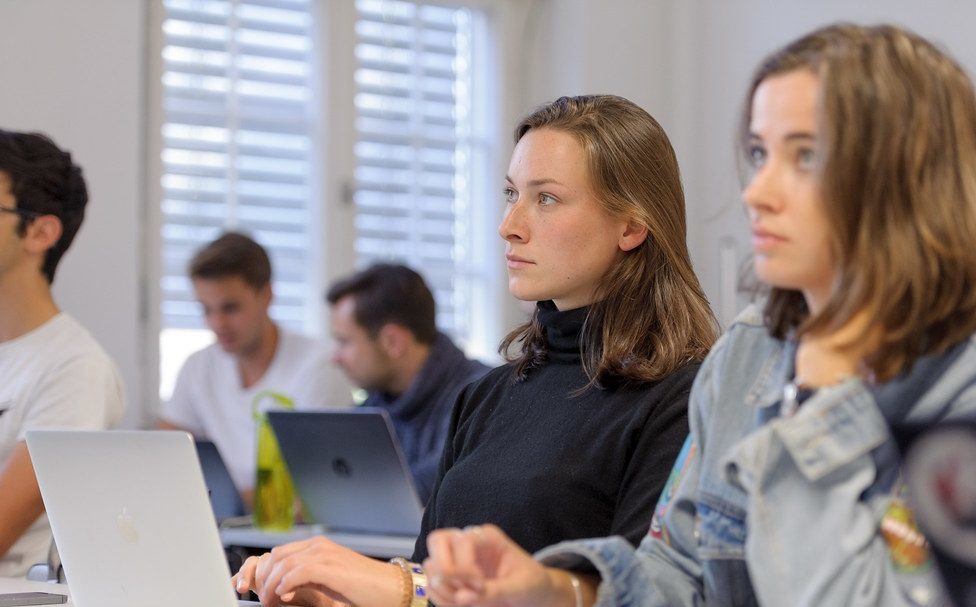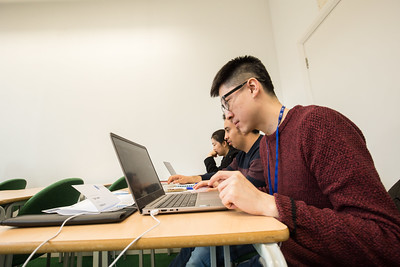Master's Programmes
Continuing your education is an important step on your career journey. This page contains useful information as you transition from your bachelor's to master's studies.
This page is designed for current ESCP Bachelor in Management students who are considering doing a master's degree after graduation.
Learn about ESCP Master's Programmes here.
# Search Questions
Deciding to do a master's programme - whether now or in a few years - is a big decision that you should consider carefully.
Here are a few questions to ask yourself if you're deciding whether to pursue a master's degree:
- What do I want to do professionally?
- Do I need a master’s degree for my ideal career?
- How important is a master’s degree vs. professional experience for my ideal career?
- Which skills do I still need to develop for my ideal job? How will I get these skills (graduate school, job, etc)?
- What added value does a master's degree bring to my job applications?

Have you already decided to pursue a master's degree? Here are questions to keep in mind as you look for specific programmes:
- Which skills do I still need to develop for my ideal job? How will this specific graduate programme help me achieve this?
- What kinds of courses does this programme offer? Do they complement my learning style and needs?
- Which additional skill-development opportunities does this programme and/or university offer? Examples include student societies, corporate events, conferences and alumni networking opportunities.
- Which support will this graduate programme provide to their students? Examples include career, financial, well-being and academic.
- Which costs are associated with doing this programme? Which funding opportunities does this programme offer?
# Action Plan
Once you have a better sense of your graduate school plans, it's action time!
We highly encourage you to make an action plan to organize yourself and to keep track of the steps you need to take for your application.

Tips for a Successful Action Plan
- Start making your plan as early as possible - ideally during your second bachelor year! This way you have more time to prepare yourself.
- Write down your top 2-3 graduate school preferences (field, location, curricular content). Use that to start your graduate school search and expand if you are stuck.
- Research country-specific graduate school application procedures early. Some countries (ex: UK, US) have early application deadlines; others (ex: Germany) have later application deadlines. Be aware that some countries may have earlier deadlines for non-citizens (primarily for visa and residence permit purposes).
- Figure out if you need admissions tests (ex: GMAT, GRE) and reserve a test spot early. Allow enough time for studying.
- Research required application materials and start assembling them.
- Participate in virtual and/or in-person recruitment events. Reach out to admissions staff and/or current students.
- Keep track of deadlines and recruitment events on a calendar.
- Apply early so you have enough time to write your application materials. Make sure you balance applications with other important commitments (classes, exams etc.).
- Discuss your plans with your career advisor.
PROGRAMME/COUNTRY SPECIFICS
Each graduate programme, university and country have their own admissions policies and procedures. We strongly encourage you to be aware of and meet these requirements. You can use this general information as a starting point, and then research application standards for specific programmes and/or countries.
# General Application Timeline
Bachelor
1
Bachelor 2
Fall
Bachelor 2
Spring
Bachelor 2/3
Summer
Bachelor 3
Fall
Bachelor 3
Spring
Explore your interests
Think about your post-graduate plans
Narrow down your
master's programme preferences
Visit campuses,
study for/take admissions exams (ex: GMAT),
figure out next steps for fall
Apply for programmes with fall deadlines (ex: UK, US),
assemble application materials
Apply for programmes with late application deadlines (ex: Germany)
# Application Materials
Exact application materials vary from programme to programme. Check each programme early closely for specific application materials and to allow yourself enough time to assemble them.
Generally graduate school applications include:
ADMISSIONS EXAMS

The most common application exam for business schools is the GMAT. Other tests include the GRE (US) and programme-specific admissions exams.
Exams may only be offered on limited dates - it is important to look into and sign up for these early.
TRANSCRIPTS

An academic transcript is an official record of your courses, grades and enrollment at a specific education institution.
The Bachelor Office at ESCP issues transcripts; contact them at poststudyaffairs@escp.eu for more information.
CV

Your curriculum vitae (CV) gives an overview of your academic, professional and extracurricular achievements. Your CV for your master's programme applications should focus on your academics and relevant experiences for your master's programme (e.g. if you are applying for a marketing programme highlight marketing experience). Our CV page has several general and Germany-specific tips to help you out.
REFERENCES

Reference letters are generally written by an instructor or supervisor who can validate your academic skills and interests. Each programme has their own requirements on who can write this reference so research this early!
Here are our tips for a good reference letter:
- Ask an instructor who knows you well. Ideally this instructor should work in a related field to your graduate programme.
- Ask your instructor early to allow them enough time to write a good reference letter.
- Provide clear instructions on letter submission deadlines and procedures (from the application).
- Share your plans and application materials so your instructor has a better sense of your application.
- Thank your instructor.
LETTER OF MOTIVATION

A motivation letter describes your interest in and fit for a specific master's programme. This brief tailored letter is a crucial pitch to set you apart from other applicants. Check out this guide for more information.
LANGUAGE CERTIFICATION

Your master's programme may require proof of a specific language level. This proof may vary from programme to programme so research this closely.
If you need to take a language level test plan accordingly and early, since test dates may be limited.
# ESCP Alumni
Every year roughly 50% of ESCP Bachelor in Management graduates start graduate school directly after graduation. The other 50% directly enter the workforce with many choosing to start graduate school at a later date.
Here is an overview of the graduate programmes and disciplines ESCP Bachelor in Management graduates have entered, as well as tips from ESCP alumni.
Keep in mind your journey to graduate school and beyond is a personal choice. It's important to select your personal criteria and preferences independent of those of your peers. We highly encourage you to explore the programmes listed and others.
UNIVERSITIES
- IE Business School (Madrid, Spain)
- Imperial College London (London, UK)
- ESSEC Business School (Paris, France)
- Kings College London (London, UK)
- ESCP Business School (various locations)
- Bocconi University (Milan, Italy)
- Sciences Po (Paris, France)
- Trinity College Dublin (Dublin, Ireland)
- Panthéon-Assas University Paris II (Paris, France)
- London Business School (London, UK)
- ESADE (Barcelona, Spain)
DISCIPLINES
- Management
- Finance & Accounting
- Marketing
- International Relations
- Economics
- Data Sciences
- Climate Change & Sustainability
- Arts & Cultural Management
- Digital & Visual Media
- Law

"Some universities have student ambassadors who can give you an overview of what the university values most in an application. Contact them with questions!"
Valery Salazar Cabanillas
Master in Strategic Marketing, Imperial College Business School (UK), 2022
Master in Market Research and Consumer Behavior, IE Business School (Spain), 2021
Bachelor in Management, ESCP, 2020

"Time and organization are key! Plan ahead with your application, be curious about alumni and take time to show your best."
Maëva Pierré
Master in Corporate & Market Communication, IE School of Human Sciences & Technology (Spain), 2021
Bachelor in Management, ESCP, 2020

"Assessors expect that your written material demonstrates high motivation and will verify this during the interview process. It is essential to communicate the purpose of your interest in the degree and how it assists you in achieving your goals."
Andres Cabre Correa
Master in Therapeutic Sciences, University of Cambridge (UK), 2022
Master in Applied Social Data Science, London School of Economics and Political Science (UK), 2021
Bachelor in Management, ESCP, 2020
# Resources
SEARCH RESOURCES
COUNTRY-SPECIFIC RESOURCES
- DAAD (Germany)
- Campus France (France)
- Universia (Spain)
- Study UK (United Kingdom)
- EducationUSA (United States of America)
# Your Contacts

Alexandra Thielicke
Post Study Affairs Manager,
Bachelors in Management
poststudyaffairs@escp.eu
+49 30 32007-185
Contact Alexandra for:
- ESCP documentation (ex: transcripts, proof of enrollment)

Julia Apple
Program Manager,
Bachelors in Management
bepobachelor@escp.eu
+49 30 32007-172
Contact Julia for:
- ESCP internship validation

Master's programme officer
Contact programme officers for:
- programme-specific questions
- information on application materials and procedures
- (virtual) campus visits
linking talents

become a







